2023年河北省衡水名校中考英语语法动词时态上二轮精讲复习课件(共90张PPT)
文档属性
| 名称 | 2023年河北省衡水名校中考英语语法动词时态上二轮精讲复习课件(共90张PPT) |  | |
| 格式 | zip | ||
| 文件大小 | 3.8MB | ||
| 资源类型 | 教案 | ||
| 版本资源 | 其它版本 | ||
| 科目 | 英语 | ||
| 更新时间 | 2022-11-20 10:52:53 | ||
图片预览

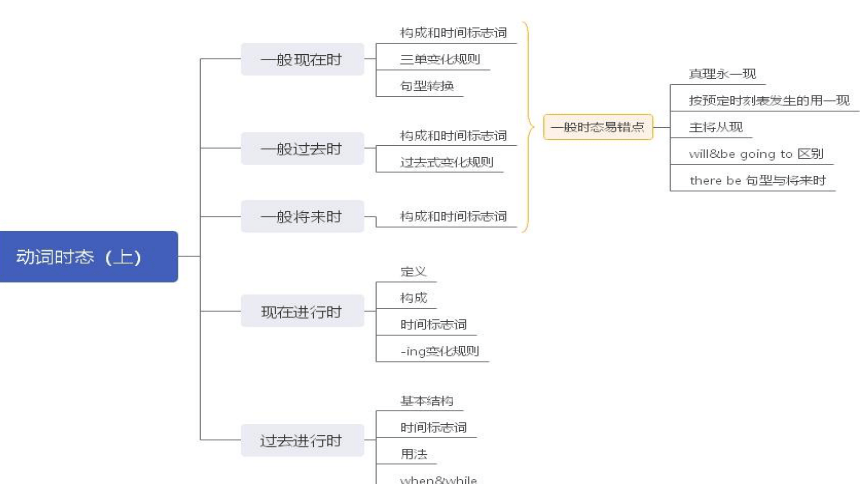

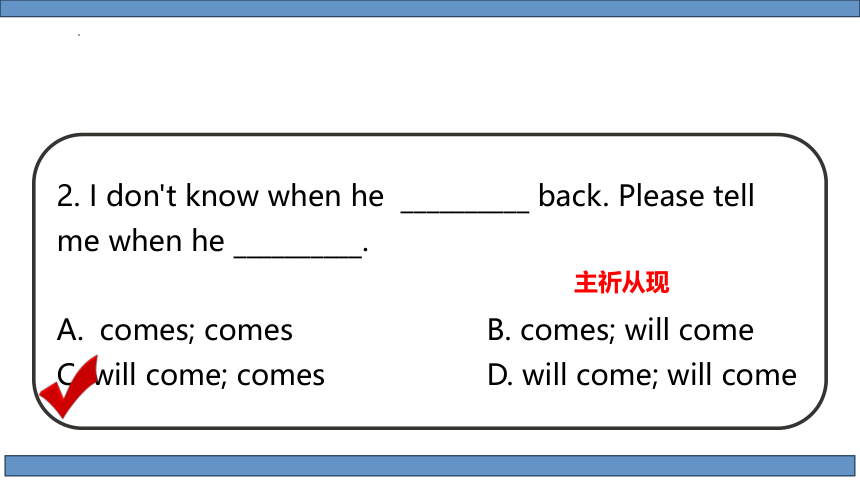
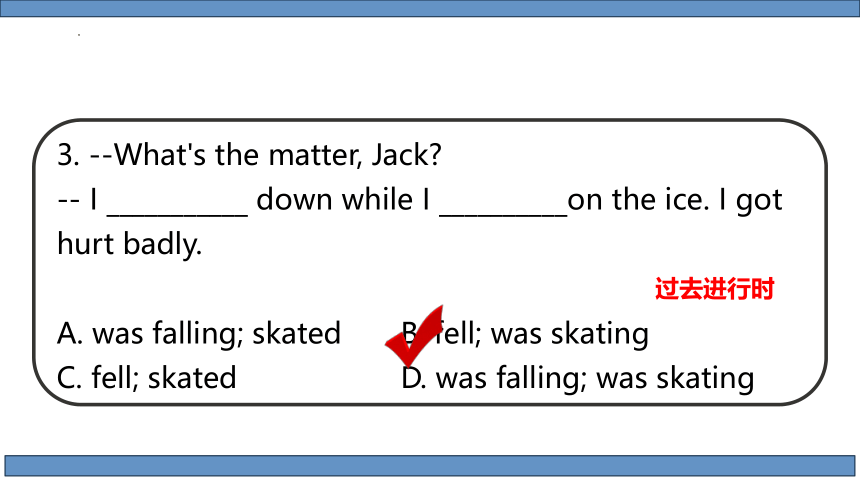
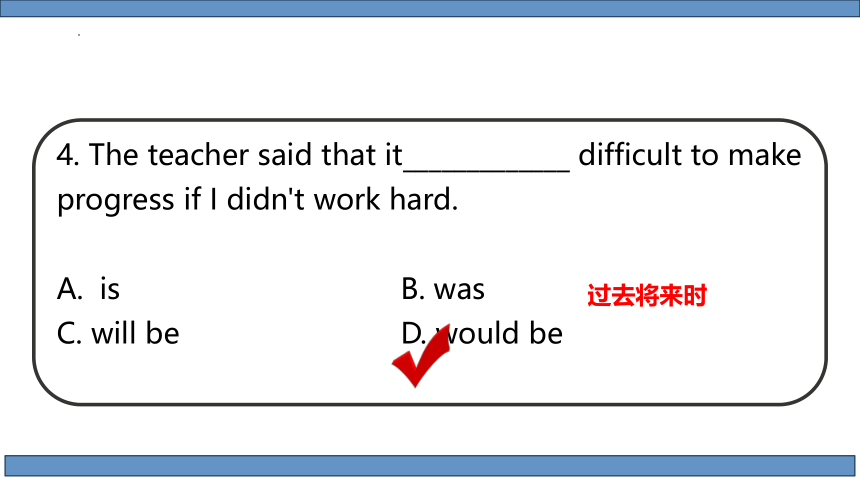
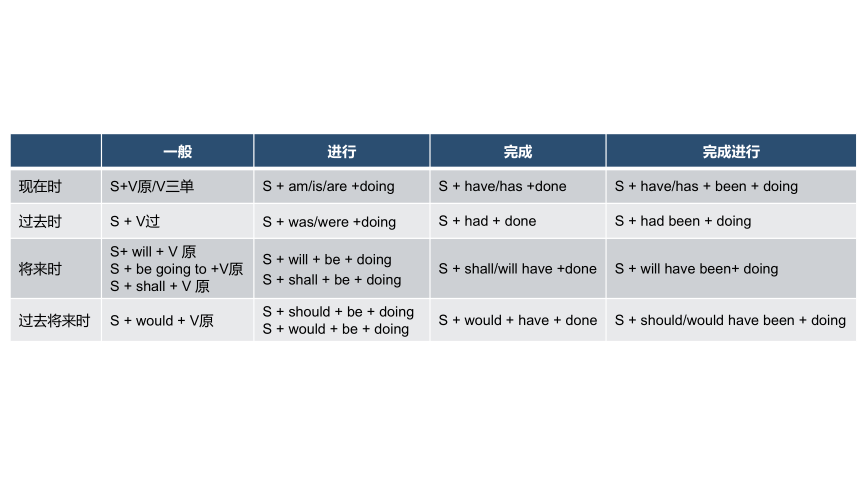
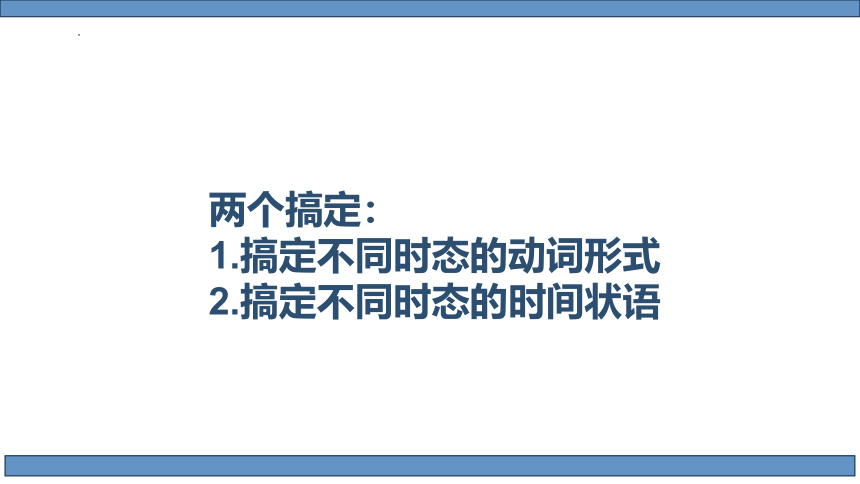
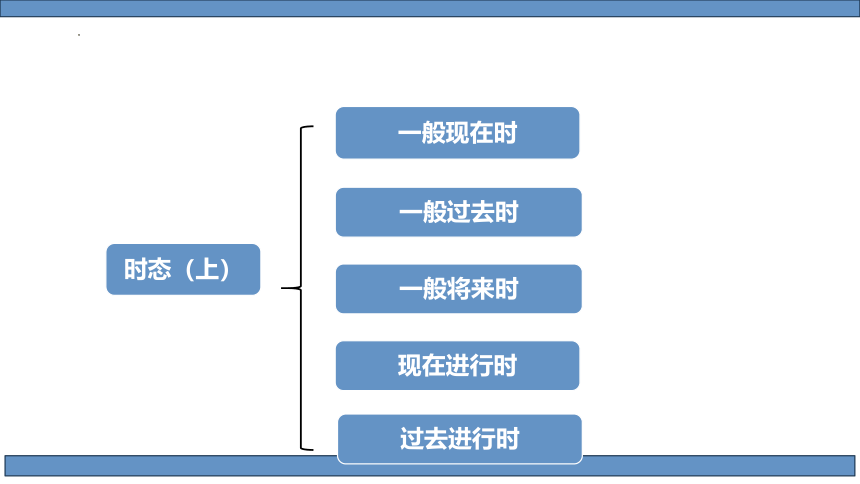

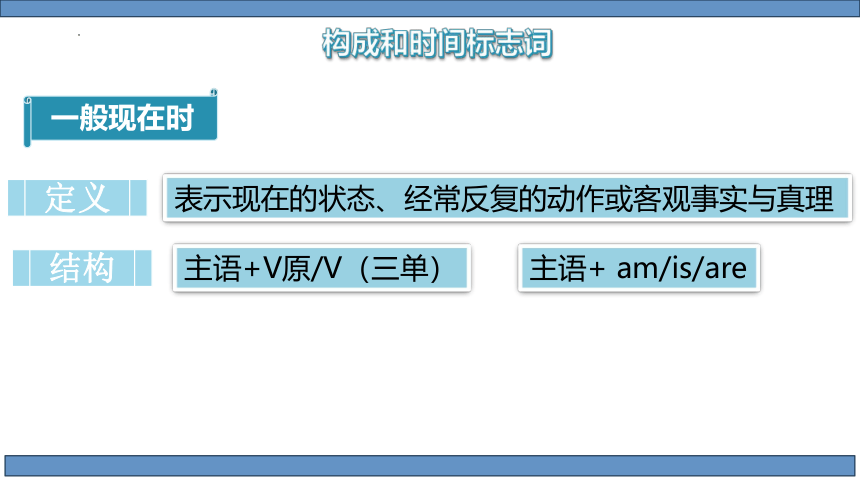

文档简介
(共90张PPT)
目录
CONTENTS
动词时态(上)
01
课程解读
1. — Have you seen my brother
—Yes. I _____________him in the library five minutes ago.
met B. have met
C. meet D. will meet
一般过去时
2. I don't know when he __________ back. Please tell me when he __________.
comes; comes B. comes; will come
C. will come; comes D. will come; will come
主祈从现
3. --What's the matter, Jack
-- I ___________ down while I __________on the ice. I got hurt badly.
A. was falling; skated B. fell; was skating
C. fell; skated D. was falling; was skating
过去进行时
4. The teacher said that it_____________ difficult to make progress if I didn't work hard.
is B. was
C. will be D. would be
过去将来时
一般 进行 完成 完成进行
现在时 S+V原/V三单 S + am/is/are +doing S + have/has +done S + have/has + been + doing
过去时 S + V过 S + was/were +doing S + had + done S + had been + doing
将来时 S+ will + V 原 S + be going to +V原 S + shall + V 原 S + will + be + doing S + shall + be + doing S + shall/will have +done S + will have been+ doing
过去将来时 S + would + V原 S + should + be + doing S + would + be + doing S + would + have + done S + should/would have been + doing
两个搞定:
1.搞定不同时态的动词形式
2.搞定不同时态的时间状语
时态(上)
一般现在时
一般将来时
一般过去时
现在进行时
过去进行时
一般现在时
01
构成和时间标志词
表示现在的状态、经常反复的动作或客观事实与真理
定义
一般现在时
主语+V原/V(三单)
结构
主语+ am/is/are
动词三单变化规则
情况 方法 示例
一般情况
以x, sh, ch, s, o结尾
以辅音字母+y结尾
特殊变化
work
s
look
s
+s
wash
es
box
es
+es
改y为i+es
study--
studies
have-has
KF always goes to work by car.
I am a student from No.8 Middle School.
The earth goes around the sun.
always
goes
am
goes
经常性,反复性
主语的特点或状态
客观真理很一般
1. 频度副词: always>usually=often>sometimes>hardly
=seldom>never
2. nowadays, today, on Sundays, on weekends
3. every系列:everyday, every week, every month, every year
时间标志词
Andy ______with his family every day.
A.exercises B.is exercising
C.will exercise D.was exercising
(2020 北京二模)- Jack, what do you often do on the weekend?
-I often _______basketball with my classmates.
A.play B.played
C.will play D.has played
句型变化
be动词
肯定句
否定句
一般疑问句
有be用be
am/is/are
直接加not
be 提前
CD is a foodie.
肯
否
Is CD a foodie
CD isn’t a foodie.
句型变化
情态动词
肯定句
否定句
一般疑问句
有情用情
情态动词+动原
情态动词后加not
情态动词提前
CD can sing well.
肯
否
Can CD sing well
CD can‘t sing well.
句型变化
实意动词
肯定句
否定句
一般疑问句
无情无be,请求助
动原/ 三单
don’t/ doesn’t
Do / Does, 动词变原形
CD likes eating hot pot.
肯
否
Does CD like eating hot pot
CD doesn’t like eating hot pot.
Her name is Kitty.( 改为一般疑问句,并做否定回答 )
___________ her name Kitty?
___________, ___________ ___________.
Is
No
it
isn’t
My cousin often visits Yushancun with his friends.(变一般疑问句)
__________ your cousin often____________ Yushancun with his friends?
Does
visit
My sister does her homework every evening.(改为一般疑问句,并作否定回答)
_______ ________sister_________ her homework every evening?
﹣No,she_________________.
Does
your
do
doesn’t
一般过去时
02
一般过去时
一、定义:
1)表示过去某个时间里发生的动作或存在的状态;
2)过去习惯性、经常性的动作和行为。
Grammar
Presentation
On Sunday morning, she went shopping.
On Sunday afternoon, she had lunch.
On Sunday evening, she watched a movie.
She always drew the pictures on Sundays last year.
Grammar
Presentation
I went shopping yesterday.
I was very happy.
主语+动词的过去式+其他成分
一般过去时
二、构成:
昨天上个XX前,in加年份when字连
I could swim when I was one.
Grammar
Presentation
一般过去时
三、标志词:
yesterday, the day before yesterday, just now
last系列 week/month/year/term
ago 系列 3 days ago
before, then(那时)
in+过去的时间点:in 2008
Grammar
课中互动
1. I went boating ______.
two days before B. two days ago
C. before two days D. ago two days
口诀 构成方法 例
直 work--
去 hope--
双 stop--
admit--
改 study--
1)规则变化
Grammar
Presentation
四、动词过去式的构成:
worked
hoped
stopped
admitted
studied
在单词后直接加-ed;
以不发音的e结尾的,去e加-ed;
以重读闭音节结尾且末尾只有一个辅音字母,
双写最后的辅音字母加-ed;
以辅音字母+y结尾的,改y为i再加-ed。
Grammar
课中互动
4. The young man ______ into the river and got the boy out of the water.
A. jump B. jumps C. jumped D. is jumping
2)不规则变化
形式 例
let-- put--
read-- cut--
hit--
come-- go--
leave-- give--
sit-- write--
Grammar
Presentation
四、动词过去式的构成:
A-A
A-B
let
read
hit
put
cut
came
left
sat
went
gave
wrote
1)否定句结构
主语+was/were not (wasn’t/weren’t)+其他成分
主语+did not (didn’t) + 动词原形 +其他成分
I was happy after watching the film.
I was not happy after watching the film.
I bought much popcorn.
I didn’t buy much popcorn.
Grammar
Presentation
五、句型转换:
有be直接加not
无be请求助!
2)一般疑问句结构
Was/Were+主语+其他成分
Did+主语+动词原形+其他成分
I was happy after watching the film.
Were you happy after watching the film
I bought much popcorn.
Did you buy much popcorn
Grammar
Presentation
五、句型转换:
有be提be,
无be请求助!
3)肯否回答
Yes, 主语+was/were.
Were you happy after watching the film
Did you buy much popcorn
Yes, I was.
No, I wasn’t.
Yes, I did.
No, I didn’t.
No, 主语+wasn’t/weren’t.
Yes, 主语+did.
No, 主语+didn’t.
Grammar
Presentation
五、句型转换:
Grammar
课中互动
3. --- _____ he _____ a good rest
--- No, he didn’t.
Do, had B. Did, have C. Did, had D. Was, had
一般将来时
03
构成和时间标志词
将来某一时刻或某段时间的动作或状态
定义
主语+will/shall/be going to + do
结构
时间标志词
next系列
tomorrow系列
in+一段时间
this系列
tomorrow morning
in two days
next week
this morning
其他
soon, some day, one day,
in the future
明天下个XX后,
in+段时表将来
66
The famous writer_____ a book next year.
A.have written B.will write
C.wrote D.write
-I ______a movie tomorrow. Would you like to go with me?
-Yes, I'd love to.
A.see
B.saw
C.am going to see
一般时态易错点
1. 真理永一现
Jerry told us the earth ________(go) around the sun.
2.按预定时刻表发生的用一现
According to the timetable, our plane_____(take) off at 8:10.
goes
takes
The teacher told us that the earth __________ (move) around the sun.
moves
一般时态易错点
3. 主将从现:时间、条件状语从句
If it rains tomorrow, we won’t go to the park.
从句
if后是从句
主句
另一部分是主句
从句用一般现在时
主句用一般将来时
主将从现
rains
won’t go
一般时态易错点
如果
时间状从连词
when 当…时候
as soon as一…就
until 直到…
while 当…时候
before 在…之前
条件状从连词
unless除非
if 如果
找连词
一般时态易错点
Turn off the light when you leave.
主句
从句
主句是祈使句
从句用一般现在时
主祈从现
CD can travel around the world if she has enough money.
主句
从句
主句有情态动词
主情从现
从句用一般现在时
一般时态易错点
﹣﹣Jim, please tell me when your father's train_________ tomorrow.
﹣﹣I am not sure, mom. As soon as he_________,I will call you.
A.arrives;arrives
B.will arrive;will arrive
C.will arrive;arrives
D.arrives;will arrive
The children ______ be 5 next year.
He is seriously ill. I think he
_________ die.
will 客观现实
be going to 主观判断
4. will & be going to 区别
will
is going to
will 临时决定
be going to 计划打算
I ________ take a birthday party.
We ______ go to see it later.
will
am going to
Look at the clouds. It _________ rain.
He ______ be here in half an hour.
will 无迹象
be going to 有迹象
is going to
will
一般时态易错点
﹣ Look at the sky. It's cloudy.
﹣ I think it ___________ soon.
A.rains B.rained
C.will rain D.is going to rain
5. There be句型与将来时
There______________ a concert tomorrow.
will be
is going to be
结构:
There will be+ 其他
There is/are going to be+其他
一般时态易错点
There _______ any classes tomorrow if there ______ too much snow.
A.isn't going to be, is going to be
B.aren't going to have, is
C.aren't going to be, is
D.aren't going to be, is going to be
04
现在进行时
04
现在进行时:表示说话时正在进行的动作或现阶段存在的状态。
1.表示当下正在进行的动作
I’m loving it.
-What are you doing
-I’m helping my mom do housework.
2. 表示主语最近一段时间一直忙于的动作
-What are you doing these days
-I’m preparing for my test.
定义
肯定句:主语 + am/is/are + doing + 其他
He is drinking water.
They are watching TV now.
He is not (isn’t) drinking water.
They are not (aren’t) watching TV now.
否定句:主语 + am/is/are + not + doing + 其他
构成
一般疑问句:Am/Is/Are +主语 + doing + 其他
Is the boy doing his homework now
Are the men playing basketball
What is the boy doing
What are they doing
特殊疑问句:疑问词 + am/is/are +主语 + doing + 其他
构成
现在进行时时间标志词
看听类(引起关注类) ---Look! What are they doing
---Girls are dancing while boys are singing.
Look!Listen!Be careful! Watch out小心! Be quiet! Hurry up!
现在类:now, at present, at the moment
其他类:these days, at the moment, right now
时间标志词
找人类(谈论对象不在场):
- Where is xxx
- Xxx is doing sth. /He has gone to Shanghai(现在完成)
此时此刻现阶段,
看听在哪儿请安静
Look! Mark _______ the flowers in the garden.
A.was watering B.is watering
C.waters D.watered
﹣Kitty________ well these days.
﹣_____________ go to see her?
A. isn't feeling; Why not you
B. isn't feeling; Why don't we
C. won't feel; Why not
D. isn't feeling; What about
The boy helps his mother do housework every day. (用now改写句子)
__________________________________________________
The boy is helping his mother do housework now.
动词现在分词构成
一般情况:直接在动词后加 ing
read eat
drink listen
以不发音字母e结尾的动词,去e再加ing
write make
take drive
reading
drinking
eating
listening
writing
taking
making
driving
以辅音字母+元音字母+辅音字母(辅元辅结构)的重读闭音节词,双写末尾辅音字母再加 ing
sit swim
put run
get begin
sitting
putting
swimming
running
以ie结尾,变ie为y+ing
lie die
tie
lying
tying
dying
getting
beginning
动词现在分词构成
写出下列动词的三单-过去式-ing形式
take __________ ___________ ___________
watch __________ ___________ ___________
see __________ ___________ ___________
have __________ ___________ ___________
go __________ ___________ ___________
think __________ ___________ ___________
buy __________ ___________ ___________
pay __________ ___________ ___________
lie(说谎) __________ ___________ ___________
stop __________ ___________ ___________
watches
took
taking
takes
watched
watching
sees
seeing
saw
has
had
having
goes
went
going
thinks
thought
thinking
buys
bought
buying
pays
lies
paying
paid
lied
lying
stops
stopped
stopping
现在进行时的易错点
1. 现在进行时表将来
I’m coming with you!
We’re arriving at Xidan stop, please be ready to get off.
I’m going to have a party tonight.
2. 感官动词不用于进行时态
see, hear, smell, taste, feel等词不用于进行时态
The food tastes delicious.
The food is tasting delicious.
√
X
口诀:来来去去,到达离开,开始死
come go leave arrive begin die
3. 现在进行时与always,all the time联用,表感彩
He is always helping other people.
You are always lying!
Tom is making noises all the time!
抱怨
抱怨
赞美
现在进行时的易错点
Grammar
Presentation
I eat hamburgers every day.
I ate hamburgers yesterday.
I am eating hamburgers now.
I will eat hamburgers tomorrow.
一般现在时
一般过去时
现在进行时
一般将来时
注意
动词哦!
主语+do/does
主语+did
主语+am/is/are doing
主语+will/shall do
主语+am/is/are going to do
The hamburgers are delicious.
主语+am/is/are
I was very happy.
主语+was/were
四大时态复习
四大时态结构
I shall eat hamburgers tomorrow.
I am going to eat hamburgers tomorrow.
时态 意义 标志词
一般现在时
一般过去时
一般将来时
现在进行时
经常、习惯的动作/状态/真理
过去发生的动作或状态
将要发生/计划要做的动作
1.说话时正在发生的动作
2.最近一段时间持续进行的动作
often, always, usually, sometimes, once a week, every day
yesterday, last week, ago, in 1998, just now, used to do
tomorrow, next week, in the future, in two days, in 2100
now, look, listen, at this moment, these days
昨天上个XX前,
in加年份when字连
明天下个XX后,
in+段时表将来
此时此刻现阶段,
看听在哪儿请安静
四大时态复习
过去进行时
05
Someone was knocking at my door at 12 o’clock last night.
It wasn’t me.
I was watching TV at that time.
What were you doing at 12 o’clock last night
What were you doing at 12 o’clock last night
It wasn’t me.
I was sleeping at 12 o’clock last night.
What were you doing at 12 o’clock last night
It wasn’t us.
We were doing our homework then.
I was watching TV at that time.
We were doing our homework then.
I was sleeping at 12 o’clock last night.
过去进行时
表示在过去某一时刻或某一段时间里正在进行的动作。
定 义
基本结构
was/ were + doing
I was watching TV at that time.
We were doing our homework then.
I was sleeping at 12 o’clock last night.
句型转换
肯定句
否定句
一般疑问句
特殊疑问句
was/were + not + doing+其他
was/were + doing+其他
Was/Were +主语 +doing+其他
特殊疑问词+ was/were+主语+doing+其他
He was sleeping at that time.
He wasn’t sleeping at that time.
Was he sleeping at that time
What was he doing at that time
一般疑问句:
有be提be,有情提情。
无be无情请求助!
否定句:
有be有情,直接加not。
无be无情请求助!
I was watching TV at that time.
We were doing our homework then.
I was sleeping at 12 o’clock last night.
标志词
at that time; then
at X o'clock last night
the whole morning, all day
from xx to xx yesterday
when, while
I was watching TV at that time.
We were doing our homework then.
I was sleeping at 12 o’clock last night.
用法一 标志词法
at that time; then
at X o'clock last night
the whole morning, all day
from xx to xx yesterday
when, while
用所给词的适当形式填空。
1. I _________ (have) dinner at half past six yesterday evening.
2. -- what ______________ at 10:00 yesterday evening
-- I ________ (do) my homework at home.
was having
were you doing
was doing
用法二 时间差法
I called you yesterday morning , but nobody answered.
I was sleeping at that time.
什么是时间差?
A:我昨天这会儿去你家(敲门),给你打电话,跟你聊天,约你……你通通不搭理,why?
我正在帮妈妈做饭,浇花,写作业,跟别人聊天.......
对话形式
______ you ______ a meeting at four yesterday afternoon We went to your office, but didn’t see you.
A. Are; having B. Were; having
C. Did; have D. Have; had
—Did you hear the strange noise next door at around 10 o’clock last night
—No. I _____ my favorite music in my bedroom.
A. listen B. listened to
C. was listening to D. am listening to
什么是长(延续性)动作?
eat
sleep
play
when & while
什么是短(不可延续性)动作?
come
die
borrow
when & while
① 两个动作发生在过去, 一长一短, 长的用过进,短的用一过。
长动作(过进)+ when + 短动作(一过)
I was playing the game when my mother got home yesterday.
when & while
用法三 特殊用法
I was eating LT while my brother was doing homework.
②两个过去动作同时进行且都长,都用过进。
长动作(过进)+ while + 长动作(过进)
when & while
Jane ________ the plants in the garden when the phone in the living room rang.
A.waters B.has watered
C.was watering D.will water
My younger sister________________( cut ) a watermelon with a knife when I got home from school.
was cutting
比打游戏被你妈发现更恐怖的事情是?
when & while
When the teacher came in, we were talking.
While the teacher came in, we were talking.
When we were talking, the teacher came in.
While we were talking, the teacher came in.
We were talking when the teacher came in.
We were talking while the teacher came in.
以下句子正确的是
when & while
I saw Sam and David in the playground yesterday afternoon. They ______ games with their classmates then.
A. play B. will play
C. are playing D. were playing
My mother ______ dinner when I got home yesterday.
A. has cooked B. was cooking
C. will cook D. cooks
She _____ an English magazine when I came in.
A. reads B. has read
C. will read D. was reading
课程回顾
目录
CONTENTS
动词时态(上)
01
课程解读
1. — Have you seen my brother
—Yes. I _____________him in the library five minutes ago.
met B. have met
C. meet D. will meet
一般过去时
2. I don't know when he __________ back. Please tell me when he __________.
comes; comes B. comes; will come
C. will come; comes D. will come; will come
主祈从现
3. --What's the matter, Jack
-- I ___________ down while I __________on the ice. I got hurt badly.
A. was falling; skated B. fell; was skating
C. fell; skated D. was falling; was skating
过去进行时
4. The teacher said that it_____________ difficult to make progress if I didn't work hard.
is B. was
C. will be D. would be
过去将来时
一般 进行 完成 完成进行
现在时 S+V原/V三单 S + am/is/are +doing S + have/has +done S + have/has + been + doing
过去时 S + V过 S + was/were +doing S + had + done S + had been + doing
将来时 S+ will + V 原 S + be going to +V原 S + shall + V 原 S + will + be + doing S + shall + be + doing S + shall/will have +done S + will have been+ doing
过去将来时 S + would + V原 S + should + be + doing S + would + be + doing S + would + have + done S + should/would have been + doing
两个搞定:
1.搞定不同时态的动词形式
2.搞定不同时态的时间状语
时态(上)
一般现在时
一般将来时
一般过去时
现在进行时
过去进行时
一般现在时
01
构成和时间标志词
表示现在的状态、经常反复的动作或客观事实与真理
定义
一般现在时
主语+V原/V(三单)
结构
主语+ am/is/are
动词三单变化规则
情况 方法 示例
一般情况
以x, sh, ch, s, o结尾
以辅音字母+y结尾
特殊变化
work
s
look
s
+s
wash
es
box
es
+es
改y为i+es
study--
studies
have-has
KF always goes to work by car.
I am a student from No.8 Middle School.
The earth goes around the sun.
always
goes
am
goes
经常性,反复性
主语的特点或状态
客观真理很一般
1. 频度副词: always>usually=often>sometimes>hardly
=seldom>never
2. nowadays, today, on Sundays, on weekends
3. every系列:everyday, every week, every month, every year
时间标志词
Andy ______with his family every day.
A.exercises B.is exercising
C.will exercise D.was exercising
(2020 北京二模)- Jack, what do you often do on the weekend?
-I often _______basketball with my classmates.
A.play B.played
C.will play D.has played
句型变化
be动词
肯定句
否定句
一般疑问句
有be用be
am/is/are
直接加not
be 提前
CD is a foodie.
肯
否
Is CD a foodie
CD isn’t a foodie.
句型变化
情态动词
肯定句
否定句
一般疑问句
有情用情
情态动词+动原
情态动词后加not
情态动词提前
CD can sing well.
肯
否
Can CD sing well
CD can‘t sing well.
句型变化
实意动词
肯定句
否定句
一般疑问句
无情无be,请求助
动原/ 三单
don’t/ doesn’t
Do / Does, 动词变原形
CD likes eating hot pot.
肯
否
Does CD like eating hot pot
CD doesn’t like eating hot pot.
Her name is Kitty.( 改为一般疑问句,并做否定回答 )
___________ her name Kitty?
___________, ___________ ___________.
Is
No
it
isn’t
My cousin often visits Yushancun with his friends.(变一般疑问句)
__________ your cousin often____________ Yushancun with his friends?
Does
visit
My sister does her homework every evening.(改为一般疑问句,并作否定回答)
_______ ________sister_________ her homework every evening?
﹣No,she_________________.
Does
your
do
doesn’t
一般过去时
02
一般过去时
一、定义:
1)表示过去某个时间里发生的动作或存在的状态;
2)过去习惯性、经常性的动作和行为。
Grammar
Presentation
On Sunday morning, she went shopping.
On Sunday afternoon, she had lunch.
On Sunday evening, she watched a movie.
She always drew the pictures on Sundays last year.
Grammar
Presentation
I went shopping yesterday.
I was very happy.
主语+动词的过去式+其他成分
一般过去时
二、构成:
昨天上个XX前,in加年份when字连
I could swim when I was one.
Grammar
Presentation
一般过去时
三、标志词:
yesterday, the day before yesterday, just now
last系列 week/month/year/term
ago 系列 3 days ago
before, then(那时)
in+过去的时间点:in 2008
Grammar
课中互动
1. I went boating ______.
two days before B. two days ago
C. before two days D. ago two days
口诀 构成方法 例
直 work--
去 hope--
双 stop--
admit--
改 study--
1)规则变化
Grammar
Presentation
四、动词过去式的构成:
worked
hoped
stopped
admitted
studied
在单词后直接加-ed;
以不发音的e结尾的,去e加-ed;
以重读闭音节结尾且末尾只有一个辅音字母,
双写最后的辅音字母加-ed;
以辅音字母+y结尾的,改y为i再加-ed。
Grammar
课中互动
4. The young man ______ into the river and got the boy out of the water.
A. jump B. jumps C. jumped D. is jumping
2)不规则变化
形式 例
let-- put--
read-- cut--
hit--
come-- go--
leave-- give--
sit-- write--
Grammar
Presentation
四、动词过去式的构成:
A-A
A-B
let
read
hit
put
cut
came
left
sat
went
gave
wrote
1)否定句结构
主语+was/were not (wasn’t/weren’t)+其他成分
主语+did not (didn’t) + 动词原形 +其他成分
I was happy after watching the film.
I was not happy after watching the film.
I bought much popcorn.
I didn’t buy much popcorn.
Grammar
Presentation
五、句型转换:
有be直接加not
无be请求助!
2)一般疑问句结构
Was/Were+主语+其他成分
Did+主语+动词原形+其他成分
I was happy after watching the film.
Were you happy after watching the film
I bought much popcorn.
Did you buy much popcorn
Grammar
Presentation
五、句型转换:
有be提be,
无be请求助!
3)肯否回答
Yes, 主语+was/were.
Were you happy after watching the film
Did you buy much popcorn
Yes, I was.
No, I wasn’t.
Yes, I did.
No, I didn’t.
No, 主语+wasn’t/weren’t.
Yes, 主语+did.
No, 主语+didn’t.
Grammar
Presentation
五、句型转换:
Grammar
课中互动
3. --- _____ he _____ a good rest
--- No, he didn’t.
Do, had B. Did, have C. Did, had D. Was, had
一般将来时
03
构成和时间标志词
将来某一时刻或某段时间的动作或状态
定义
主语+will/shall/be going to + do
结构
时间标志词
next系列
tomorrow系列
in+一段时间
this系列
tomorrow morning
in two days
next week
this morning
其他
soon, some day, one day,
in the future
明天下个XX后,
in+段时表将来
66
The famous writer_____ a book next year.
A.have written B.will write
C.wrote D.write
-I ______a movie tomorrow. Would you like to go with me?
-Yes, I'd love to.
A.see
B.saw
C.am going to see
一般时态易错点
1. 真理永一现
Jerry told us the earth ________(go) around the sun.
2.按预定时刻表发生的用一现
According to the timetable, our plane_____(take) off at 8:10.
goes
takes
The teacher told us that the earth __________ (move) around the sun.
moves
一般时态易错点
3. 主将从现:时间、条件状语从句
If it rains tomorrow, we won’t go to the park.
从句
if后是从句
主句
另一部分是主句
从句用一般现在时
主句用一般将来时
主将从现
rains
won’t go
一般时态易错点
如果
时间状从连词
when 当…时候
as soon as一…就
until 直到…
while 当…时候
before 在…之前
条件状从连词
unless除非
if 如果
找连词
一般时态易错点
Turn off the light when you leave.
主句
从句
主句是祈使句
从句用一般现在时
主祈从现
CD can travel around the world if she has enough money.
主句
从句
主句有情态动词
主情从现
从句用一般现在时
一般时态易错点
﹣﹣Jim, please tell me when your father's train_________ tomorrow.
﹣﹣I am not sure, mom. As soon as he_________,I will call you.
A.arrives;arrives
B.will arrive;will arrive
C.will arrive;arrives
D.arrives;will arrive
The children ______ be 5 next year.
He is seriously ill. I think he
_________ die.
will 客观现实
be going to 主观判断
4. will & be going to 区别
will
is going to
will 临时决定
be going to 计划打算
I ________ take a birthday party.
We ______ go to see it later.
will
am going to
Look at the clouds. It _________ rain.
He ______ be here in half an hour.
will 无迹象
be going to 有迹象
is going to
will
一般时态易错点
﹣ Look at the sky. It's cloudy.
﹣ I think it ___________ soon.
A.rains B.rained
C.will rain D.is going to rain
5. There be句型与将来时
There______________ a concert tomorrow.
will be
is going to be
结构:
There will be+ 其他
There is/are going to be+其他
一般时态易错点
There _______ any classes tomorrow if there ______ too much snow.
A.isn't going to be, is going to be
B.aren't going to have, is
C.aren't going to be, is
D.aren't going to be, is going to be
04
现在进行时
04
现在进行时:表示说话时正在进行的动作或现阶段存在的状态。
1.表示当下正在进行的动作
I’m loving it.
-What are you doing
-I’m helping my mom do housework.
2. 表示主语最近一段时间一直忙于的动作
-What are you doing these days
-I’m preparing for my test.
定义
肯定句:主语 + am/is/are + doing + 其他
He is drinking water.
They are watching TV now.
He is not (isn’t) drinking water.
They are not (aren’t) watching TV now.
否定句:主语 + am/is/are + not + doing + 其他
构成
一般疑问句:Am/Is/Are +主语 + doing + 其他
Is the boy doing his homework now
Are the men playing basketball
What is the boy doing
What are they doing
特殊疑问句:疑问词 + am/is/are +主语 + doing + 其他
构成
现在进行时时间标志词
看听类(引起关注类) ---Look! What are they doing
---Girls are dancing while boys are singing.
Look!Listen!Be careful! Watch out小心! Be quiet! Hurry up!
现在类:now, at present, at the moment
其他类:these days, at the moment, right now
时间标志词
找人类(谈论对象不在场):
- Where is xxx
- Xxx is doing sth. /He has gone to Shanghai(现在完成)
此时此刻现阶段,
看听在哪儿请安静
Look! Mark _______ the flowers in the garden.
A.was watering B.is watering
C.waters D.watered
﹣Kitty________ well these days.
﹣_____________ go to see her?
A. isn't feeling; Why not you
B. isn't feeling; Why don't we
C. won't feel; Why not
D. isn't feeling; What about
The boy helps his mother do housework every day. (用now改写句子)
__________________________________________________
The boy is helping his mother do housework now.
动词现在分词构成
一般情况:直接在动词后加 ing
read eat
drink listen
以不发音字母e结尾的动词,去e再加ing
write make
take drive
reading
drinking
eating
listening
writing
taking
making
driving
以辅音字母+元音字母+辅音字母(辅元辅结构)的重读闭音节词,双写末尾辅音字母再加 ing
sit swim
put run
get begin
sitting
putting
swimming
running
以ie结尾,变ie为y+ing
lie die
tie
lying
tying
dying
getting
beginning
动词现在分词构成
写出下列动词的三单-过去式-ing形式
take __________ ___________ ___________
watch __________ ___________ ___________
see __________ ___________ ___________
have __________ ___________ ___________
go __________ ___________ ___________
think __________ ___________ ___________
buy __________ ___________ ___________
pay __________ ___________ ___________
lie(说谎) __________ ___________ ___________
stop __________ ___________ ___________
watches
took
taking
takes
watched
watching
sees
seeing
saw
has
had
having
goes
went
going
thinks
thought
thinking
buys
bought
buying
pays
lies
paying
paid
lied
lying
stops
stopped
stopping
现在进行时的易错点
1. 现在进行时表将来
I’m coming with you!
We’re arriving at Xidan stop, please be ready to get off.
I’m going to have a party tonight.
2. 感官动词不用于进行时态
see, hear, smell, taste, feel等词不用于进行时态
The food tastes delicious.
The food is tasting delicious.
√
X
口诀:来来去去,到达离开,开始死
come go leave arrive begin die
3. 现在进行时与always,all the time联用,表感彩
He is always helping other people.
You are always lying!
Tom is making noises all the time!
抱怨
抱怨
赞美
现在进行时的易错点
Grammar
Presentation
I eat hamburgers every day.
I ate hamburgers yesterday.
I am eating hamburgers now.
I will eat hamburgers tomorrow.
一般现在时
一般过去时
现在进行时
一般将来时
注意
动词哦!
主语+do/does
主语+did
主语+am/is/are doing
主语+will/shall do
主语+am/is/are going to do
The hamburgers are delicious.
主语+am/is/are
I was very happy.
主语+was/were
四大时态复习
四大时态结构
I shall eat hamburgers tomorrow.
I am going to eat hamburgers tomorrow.
时态 意义 标志词
一般现在时
一般过去时
一般将来时
现在进行时
经常、习惯的动作/状态/真理
过去发生的动作或状态
将要发生/计划要做的动作
1.说话时正在发生的动作
2.最近一段时间持续进行的动作
often, always, usually, sometimes, once a week, every day
yesterday, last week, ago, in 1998, just now, used to do
tomorrow, next week, in the future, in two days, in 2100
now, look, listen, at this moment, these days
昨天上个XX前,
in加年份when字连
明天下个XX后,
in+段时表将来
此时此刻现阶段,
看听在哪儿请安静
四大时态复习
过去进行时
05
Someone was knocking at my door at 12 o’clock last night.
It wasn’t me.
I was watching TV at that time.
What were you doing at 12 o’clock last night
What were you doing at 12 o’clock last night
It wasn’t me.
I was sleeping at 12 o’clock last night.
What were you doing at 12 o’clock last night
It wasn’t us.
We were doing our homework then.
I was watching TV at that time.
We were doing our homework then.
I was sleeping at 12 o’clock last night.
过去进行时
表示在过去某一时刻或某一段时间里正在进行的动作。
定 义
基本结构
was/ were + doing
I was watching TV at that time.
We were doing our homework then.
I was sleeping at 12 o’clock last night.
句型转换
肯定句
否定句
一般疑问句
特殊疑问句
was/were + not + doing+其他
was/were + doing+其他
Was/Were +主语 +doing+其他
特殊疑问词+ was/were+主语+doing+其他
He was sleeping at that time.
He wasn’t sleeping at that time.
Was he sleeping at that time
What was he doing at that time
一般疑问句:
有be提be,有情提情。
无be无情请求助!
否定句:
有be有情,直接加not。
无be无情请求助!
I was watching TV at that time.
We were doing our homework then.
I was sleeping at 12 o’clock last night.
标志词
at that time; then
at X o'clock last night
the whole morning, all day
from xx to xx yesterday
when, while
I was watching TV at that time.
We were doing our homework then.
I was sleeping at 12 o’clock last night.
用法一 标志词法
at that time; then
at X o'clock last night
the whole morning, all day
from xx to xx yesterday
when, while
用所给词的适当形式填空。
1. I _________ (have) dinner at half past six yesterday evening.
2. -- what ______________ at 10:00 yesterday evening
-- I ________ (do) my homework at home.
was having
were you doing
was doing
用法二 时间差法
I called you yesterday morning , but nobody answered.
I was sleeping at that time.
什么是时间差?
A:我昨天这会儿去你家(敲门),给你打电话,跟你聊天,约你……你通通不搭理,why?
我正在帮妈妈做饭,浇花,写作业,跟别人聊天.......
对话形式
______ you ______ a meeting at four yesterday afternoon We went to your office, but didn’t see you.
A. Are; having B. Were; having
C. Did; have D. Have; had
—Did you hear the strange noise next door at around 10 o’clock last night
—No. I _____ my favorite music in my bedroom.
A. listen B. listened to
C. was listening to D. am listening to
什么是长(延续性)动作?
eat
sleep
play
when & while
什么是短(不可延续性)动作?
come
die
borrow
when & while
① 两个动作发生在过去, 一长一短, 长的用过进,短的用一过。
长动作(过进)+ when + 短动作(一过)
I was playing the game when my mother got home yesterday.
when & while
用法三 特殊用法
I was eating LT while my brother was doing homework.
②两个过去动作同时进行且都长,都用过进。
长动作(过进)+ while + 长动作(过进)
when & while
Jane ________ the plants in the garden when the phone in the living room rang.
A.waters B.has watered
C.was watering D.will water
My younger sister________________( cut ) a watermelon with a knife when I got home from school.
was cutting
比打游戏被你妈发现更恐怖的事情是?
when & while
When the teacher came in, we were talking.
While the teacher came in, we were talking.
When we were talking, the teacher came in.
While we were talking, the teacher came in.
We were talking when the teacher came in.
We were talking while the teacher came in.
以下句子正确的是
when & while
I saw Sam and David in the playground yesterday afternoon. They ______ games with their classmates then.
A. play B. will play
C. are playing D. were playing
My mother ______ dinner when I got home yesterday.
A. has cooked B. was cooking
C. will cook D. cooks
She _____ an English magazine when I came in.
A. reads B. has read
C. will read D. was reading
课程回顾
同课章节目录
- 词法
- 名词
- 动词和动词短语
- 动词语态
- 动词时态
- 助动词和情态动词
- 非谓语动词
- 冠词
- 代词
- 数词和量词
- 形容词副词及其比较等级
- 介词和介词短语
- 连词和感叹词
- 构词法
- 相似、相近词比较
- 句法
- 陈述句
- 一般疑问句和否定疑问句
- 特殊疑问句及选择疑问句
- 反意疑问句
- 存在句(There be句型)
- 宾语从句
- 定语从句
- 状语从句
- 主谓一致问题
- 简单句
- 并列句
- 复合句
- 主谓一致
- 主、表语从句
- 名词性从句
- 直接引语和间接引语
- 虚拟语气
- 感叹句
- 强调句
- 倒装句
- 祈使句
- 句子的成分
- 句子的分类
- 题型专区
- 单项选择部分
- 易错题
- 完形填空
- 阅读理解
- 词汇练习
- 听说训练
- 句型转换
- 补全对话
- 短文改错
- 翻译
- 书面表达
- 任务型阅读
- 语法填空
- 其他资料
